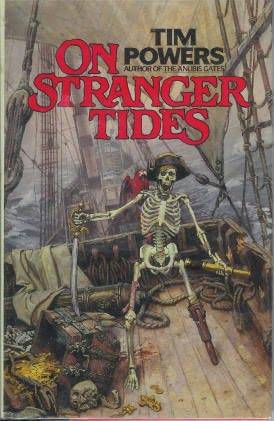The lights went out, and Shadow saw the Gods
And, while it took me almost three weeks to savor and get the taste of The Magicians out of my mouth, here we are now, with a book that is the exact opposite: Sweet, genuinely heartbreaking, and filled with plotlines that actually make sense.
I first ran into American Gods in the throes of my Neil Gaiman fanboy period. It was kind of nice, finding out one of my favorite authors and the one I liked the most at the time had a new book out for me, and naturally I reserved the one copy the library had (it wasn't like he had the rock star levels of fame he has now, so it was easy to get) and got around to reading it.
I didn't finish it, sadly, because it was long and my attention span was too short, and I got the non-specific feeling that everything was going to crash and burn. I usually get the feeling whenever I'm watching a movie, so maybe there are certain emotional cues involved, but I can always tell when things are about to go belly-up. About a year later, I went back, read it all the way through, and finished it. And surprisingly, the first time around, I hated it.
I think it has something to do with the time and place. At the time, I'd wanted something optimistic, much like Gaiman's other works, and American Gods just didn't strike me as such. It's very bleak in places and overwhelmingly dark: In the most infamous scene (two chapters in, despite what anyone would care to tell you otherwise), a man is eaten alive in an unsettling manner by a goddess, telling her all the while that he worships her. So I decried the book to those who'd listen and put it down for a while, hating that it ended on such a down note.
Ten years later, at Book Expo America, I happened upon the book again. This time, the copy was touted as "The Author's Preferred Text" and "Tenth Anniversary Edition". Given that this was getting an anniversary edition and not the (in my opinion) highly-superior Neverwhere or his other books, my interest was piqued. So, a few months later, when I had the money, I bought my own personal copy of it. And this time, unlike last time, I was blown away.
American Gods is the story of Shadow, a man released from prison after an assault charge, who finds himself pressed into service by Mr. Wednesday, a one-eyed con man who needs a driver and extra pair of hands for a journey across the country. Shadow, whose wife and employer died in a hideous (and strangely convenient) car wreck, readily accepts and finds himself drawn into a fight he cannot possibly comprehend between the old gods drawn to America by the immigrants, and the new gods of media, technology, and other such powers. But there's something else going on, something sinister beneath every surface, and Shadow will have to figure out what it is before it consumes everything.
Honestly, I'm not sure if the extra twelve thousand words made a difference, or if it's just that I've mellowed out considerably since high school. In either case, the book's plot actually managed to stump me the first time I read it. The clues are all there, of course, but the twist at the end is honestly kind of surprising. The plotting is slow at first, but picks up quickly as the chapters go on, setting the scene for a rather bizarre and unexpected yet completely original ending. While there are places that stop dead, they seem more like needed background and side-stories, detailing Shadow's downtime in between Wednesday's jobs.
The characters are bright and colorful, with cameos from at least one or two of Gaiman's other works. Shadow is believable as a hero because he loses almost constantly and is completely out of his depth until the very end of the story. Most of Wednesday's mystery isn't revealed all at once, leaving him just as unsettling at the end of the book as he was at the beginning. Most of all, though, it's that these characters seem to inhabit the world. They're real. They have their motivations and wants, needs and hidden agendas, all of it colliding quite well. Mr. Wednesday is an especially well-drawn character, as he seems perfectly affable, but every step of the way, one can question his motives and wonder what he's really about. Finally, Laura, the character whose description I can't mention much (because just calling her by name is a minor spoiler) is almost heartbreaking in her arc, from the moment she's introduced to her final lines in the novel. It's someone you sympathize with, and also someone who you want to see more of.
And finally, the setting is very well plotted out. In his introduction, Gaiman said he tried hard not to write about anywhere he hadn't been, and it shows in spades. The setting is very vivid, and while not quite truly American, it is true enough to the version of America we all tell ourselves exists, the Ray Bradbury America. The America where things hurt and there is sadness, but there's also a lot of good, everything is beautiful in its own way, and there's a strange kind of magic to the proceedings. In other words, the fun America.
In fact, this seems to be doing what Grossman tried and failed so catastrophically to do. American Gods takes the stories of magic and strangeness, those oh-so-quintessentially American stories from the likes of Ray Bradbury or Matt Ruff, or even Michael Chabon's Summerland, and shows us what happens when the gods and their champions grow up and realize that while the world's magic, it's got a dark side as well as a light-- some of those talking animals tell you to fuck yourself and people do die. Sometimes, they don't even come back to life. Sometimes, it's even better that they don't. American Gods presents a bleaker (but still beautiful, still magical) America than the thousand magical realism books that have come before it, and in the end, while it's still pretty dark, there's a lot of hope.
However, in the interest of objectivity, I have to throw out some points that the book is weak on, and really only one segment comes to mind: "My Ainsel". In this segment, Shadow stays in a small town somewhere in the Northern Midwest, and the story switches tone from a road story to a small-town fantasy somewhere along the lines of Stephen King. And starts that small-town dark fantasy from the beginning. While the stories tie together in interesting ways and eventually leads to a nice neat ending for everything (well, except for Shadow, but he's not too bad off either), the energy of the book and indeed the tone change completely, and one begins to wonder when the hell Mr. Gaiman is going to get back to the plot in progress and on with the show.
But this is a minor quibble. American Gods is a beautiful book, beautiful in that it's all the things one could want at once-- humorous, sad, heartbreaking, frightening, and wonderful. You should own this book. You want to own this book. It's the one book to have won all kinds of literary prizes and still actually be good. That alone means you are obligated to read it. So please, buy the new edition of this book. You will enjoy it. I promise.
Next time: 20th Century Ghosts
And after that: The Sheriff of Yrnameer










